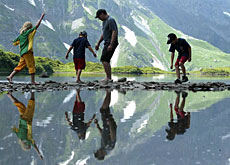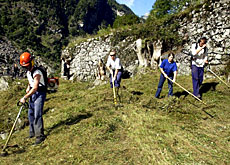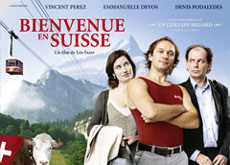Stereotypes live up to their name

The “Latin” reputation for putting family and friends before country or community seems to be borne out by the evidence – at least in Switzerland.
A study reveals that they take family obligations much more seriously than their “Germanic” counterparts, who tend to be more active in voluntary organisations.
“Social capital” has become a fashionable concept in the social sciences in recent years. It can be defined as “the set of institutions, social norms and networks of personal relationships that affect people’s daily behaviour and are an asset for the production of well-being”.
Even the World Bank has recognised the value of social capital, seeing it as an effective instrument in the fight against poverty.
A study of social ties in Switzerland’s 26 cantons revealed significant differences between the Latin and Germanic regions of Switzerland.
Civil society
With support from the Swiss National Science Foundation, Markus Freitag of Berlin’s Humboldt University analysed how many people in various parts of the country are involved in civil society organisations.
In French-speaking Geneva and Italian-speaking Ticino, just 37 and 38 per cent were active in such organisations.
By contrast, 67 per cent of residents in German-speaking canton Uri were active participants in their communities, and the proportion was almost as high in the rest of Central Switzerland.
When it came to family ties, however, the reverse applied. The Ticinese spend more time with their families than any other cultural group in Switzerland, while the German-speaking residents of Appenzell and Lucerne prefer keeping a safe distance from their relatives.
Socialising
Where friendship ties are concerned, the “Latins” again spend much more time socialising than do the German speakers.
Inhabitants of cantons Geneva, Valais and Ticino, see their friends regularly, while the people of Bern and Schaffhausen could certainly never be accused of outstaying their welcome.
In his initial analysis, Markus Freitag cites political, cultural and geographical factors. He says Switzerland’s three main cultures are very heavily influenced by the country’s neighbours – France, Germany and Italy.
“The different values, attitudes and standards of the main cultural areas on Switzerland’s borders are transmitted to the respective Swiss language regions and influence their social cultures,” he says.
Influences
But, in Freitag’s view, there are other influences at work in defining Swiss attitudes to “social capital”.
Religion plays a role: in cantons with a strong Catholic tradition, involvement in voluntary organisations, and social participation generally, is highly developed.
Then there is direct democracy: cantons in which referenda and popular initiatives are very frequent also show a high degree of involvement in voluntary organisations.
Finally, geography plays a part: in rural regions there is a much stronger sense of community, whereas city life reinforces anonymity.
Freitag regions that the combination of these three factors explains why voluntary service in the community is so developed in central Switzerland compared with other parts of the country.
Categories
On the basis of his analyses, Freitag groups the Swiss cantons into five different categories.
The first consists of the “Latin” cantons (Vaud, Valais, Neuchâtel, Geneva and Fribourg), where there is a high level of social capital based on family and friendships.
In the second group are Nidwalden, Obwalden, Uri, Zug, and Graubünden, which boast an “exceptional stock of social capital based on voluntary association”.
Appenzell Outer-Rhodes and Glarus, meanwhile, are characterised by particularly strong relationships among neighbours.
Basel City, Schaffhausen, Thurgau and Zurich are, on the whole, among the poorest in terms of social capital.
Finally, Aargau, Basel Country, Bern, Lucerne, Solothurn, St Gallen and Schwyz tend to have the strongest ties with colleagues at work.
swissinfo, Nenad Stojanovic
38% of people in Italian-speaking Ticino are active in voluntary organisations.
That compares with 69% in German-speaking Uri.
The strongest family ties are found in Italian-speaking Ticino.
French and Italian speakers place a higher value on family and friendship than on the community. The reverse applies to German speakers.
The differences are seen as cultural primarily, but in Switzerland, religion, politics and the urban/rural divide also play a role.

In compliance with the JTI standards
More: SWI swissinfo.ch certified by the Journalism Trust Initiative


You can find an overview of ongoing debates with our journalists here . Please join us!
If you want to start a conversation about a topic raised in this article or want to report factual errors, email us at english@swissinfo.ch.